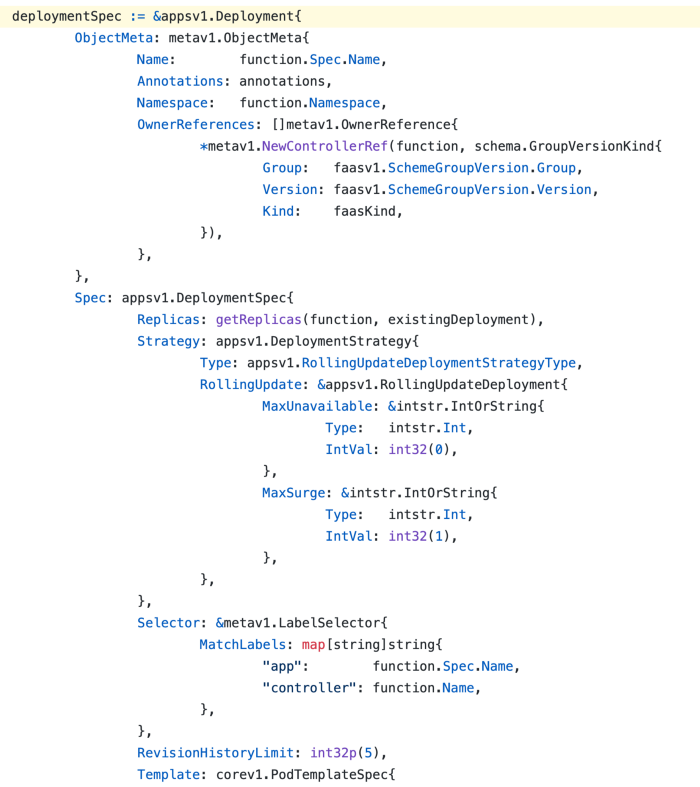Wenn Sie frühere Versionen von Kubernetes verwendet haben - dieselbe Version 1.16 -, haben Sie möglicherweise eine seltsame Warnung von gesehen kubectl run.
Bis vor kurzem konnte dieser Befehl Objekte für die Bereitstellung oder YAML über die Befehlszeile generieren. Ab Kubernetes 1.18 wurde diese Funktion auf sehr überraschende Weise unterbrochen. Der Artikel beantwortet die Fragen "Warum?" und "Wie kann man damit weiter leben?"

Denken Sie daran, dass es drei Möglichkeiten gibt, Objekte für die Bereitstellung in Kubernetes zu erstellen, bevor Sie sich eingehender mit diesen Fragen befassen:
- Über die API (wie zum Beispiel OpenFaaS)
- Durch manuelles Erstellen einer YAML-Datei. Oder realitätsnaher - kopieren und einfügen von irgendwoher von verschiedenen Websites (Hallo, StackOverflow)
- Durch Starten von
kubectl runoderkubectl run -o yaml --dry-run
Wie Sie sehen können, habe ich die Optionen auch in der Reihenfolge ihrer Komplexität aufgelistet (von schwierig bis einfach).
Optionen vergleichen
, API — , . API «extensions/v1beta», «apps/v1», YAML. , — Go YAML. Go IDE, , . Core? Meta? Apps? Extensions? , — Intellisense?

OpenFaaS Kubernetes (aka faas-netes)
— YAML . Twitter #kubernetes, , , , Kubernetes, , YAML.
, , , - , . , API Kubernetes.
apiVersion: apps/v1
kind: Deployment
metadata:
name: nginx-1
labels:
app: nginx
spec:
replicas: 1
selector:
matchLabels:
app: nginx
template:
metadata:
labels:
app: nginx
spec:
containers:
- name: nginx
image: nginx:1.14.2
ports:
- containerPort: 80Kubernetes, . , .
Kubernetes YAML , (, , . ).
:
- ;
- ;
- YAML ;
- CI\CD.
, , , :
$ kubectl run nginx-1 --image=nginx --port=80 --restart=Always, — YAML , . , ?
$ kubectl run nginx-1 --image=nginx:1.14.2 --port=80 \
--restart=Always -o yaml --dry-run
apiVersion: apps/v1
kind: Deployment
metadata:
creationTimestamp: null
labels:
run: nginx-1
name: nginx-1
spec:
replicas: 1
selector:
matchLabels:
run: nginx-1
strategy: {}
template:
metadata:
creationTimestamp: null
labels:
run: nginx-1
spec:
containers:
- image: nginx:1.14.2
name: nginx-1
ports:
- containerPort: 80
resources: {} , --replicas --serviceaccount. .
— , , Kubernetes 1.18 .
, , .
, : «, , »
$ kubectl run nginx-1 --image=nginx --port=80 --restart=Always
kubectl run --generator=deployment/apps.v1 is DEPRECATED and will be removed in a future version. Use kubectl run --generator=run-pod/v1 or kubectl create instead.
deployment.apps/nginx-1 createdkubectl 1.17 ( 1.15 ), YAML. Kubernetes 1.18 :
kubectl run nginx-1 --image=nginx --port=80 --restart=Always -o yaml --dry-run
W0512 14:27:13.111424 30104 helpers.go:535] --dry-run is deprecated and can be replaced with --dry-run=client.
apiVersion: v1
kind: Pod
metadata:
creationTimestamp: null
labels:
run: nginx-1
name: nginx-1
spec:
containers:
- image: nginx
name: nginx-1
ports:
- containerPort: 80
resources: {}
dnsPolicy: ClusterFirst
restartPolicy: AlwaysPod — Deployment. service account , , , , , ( ) ip-. Deployments Services .
, curl api, Kafka.
inlets-operator, , .

helm chart, , . Deployment, LoadBalancer, VM , , ip-.
:
kubectl run nginx-1 --image=nginx --port=80 --restart=Always
kubectl expose deployment nginx-1 --port=80 --type=LoadBalancer:
export DEPLOYMENT=nginx-1
(cat<<EOF
apiVersion: apps/v1
kind: Deployment
metadata:
name: $DEPLOYMENT
labels:
app: nginx
spec:
replicas: 1
selector:
matchLabels:
app: nginx
template:
metadata:
labels:
app: nginx
spec:
containers:
- name: nginx
image: nginx:1.14.2
ports:
- containerPort: 80
EOF
) | kubectl apply -f -
kubectl expose deployment nginx-1 --port=80 --type=LoadBalancer Kubernetes, kubectl expose ;-), Deployment. , , :
$ kubectl apply -f https://raw.githubusercontent.com/inlets/inlets-operator/master/contrib/nginx-sample-deployment.yaml, kubectl apply -f .
?
, . , kubectl create deployment.
, ,--port,--serviceaccount,--replicas--restart-policy.
kubectl create deployment --help
Create a deployment with the specified name.
Aliases:
deployment, deploy
Examples:
# Create a new deployment named my-dep that runs the busybox image.
kubectl create deployment my-dep --image=busybox
Options:
--allow-missing-template-keys=true: If true, ignore any errors in templates when a field or map key is missing in
the template. Only applies to golang and jsonpath output formats.
--dry-run='none': Must be "none", "server", or "client". If client strategy, only print the object that would be
sent, without sending it. If server strategy, submit server-side request without persisting the resource.
--image=[]: Image name to run.
-o, --output='': Output format. One of:
json|yaml|name|go-template|go-template-file|template|templatefile|jsonpath|jsonpath-file.
--save-config=false: If true, the configuration of current object will be saved in its annotation. Otherwise, the
annotation will be unchanged. This flag is useful when you want to perform kubectl apply on this object in the future.
--template='': Template string or path to template file to use when -o=go-template, -o=go-template-file. The
template format is golang templates [http://golang.org/pkg/text/template/#pkg-overview].
--validate=true: If true, use a schema to validate the input before sending it
Usage:
kubectl create deployment NAME --image=image [--dry-run=server|client|none] [options]
Use "kubectl options" for a list of global command-line options (applies to all commands). kubectl create, , YAML. — bash, .
— StackOverflow Kubernetes Deployment. ? YAML .
$ kubectl create deployment nginx-1 --image=nginx -o yaml --dry-run
W0512 14:38:18.296270 30135 helpers.go:535] --dry-run is deprecated and can be replaced with --dry-run=client.
apiVersion: apps/v1
kind: Deployment
metadata:
creationTimestamp: null
labels:
app: nginx-1
name: nginx-1
spec:
replicas: 1
selector:
matchLabels:
app: nginx-1
strategy: {}
template:
metadata:
creationTimestamp: null
labels:
app: nginx-1
spec:
containers:
- image: nginx
name: nginx
resources: {}, , restartPolicy .
?
, , , , .
Pull request 68132 , kubectl run docker run. .
, Kubernetes kubectl create deployment, , , : « — PR».

? Twitter, , .
- , , , Kubernetes, «». «».
1.18.
— , (Kubernetes, DevOps, Docker, Ansible, Ceph, SRE)